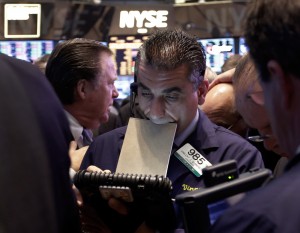
Trader Vincent Quinones, center, works on the floor of the New York Stock Exchange at the close of trading, Thursday, May 23, 2013. US stocks finished slightly lower Thursday, little-affected by a sharp selloff in Asian and European markets led by the 7.3 percent plunge of Japan’s Nikkei 225 index. AP PHOTO/RICHARD DREW
NEW YORK—US stocks finished slightly lower Thursday, little-affected by a sharp selloff in Asian and European markets led by the 7.3 percent plunge of Japan’s Nikkei 225 index.
The Dow Jones Industrial Average fell 12.67 (0.08 percent) to 15,294.50. The Dow rallied after opening sharply lower and hitting an inter-session low of 15,180.
The broad-based S&P 500 followed a similar trajectory, losing 1.1 percent in opening trade but closing at 1,650.51, off 4.84 (0.29 percent).
The tech-rich Nasdaq Composite Index ended 3.88 points lower (0.11 percent) at 3,459.42.
The losses were far more modest than in France, Britain, Germany and Hong Kong, each of which fell more than 2 percent, and the Nikkei’s huge fall, sparked by data showing manufacturing activity in China contracted in May for the first time in seven months, another sign of the weakness of China’s recovery.
Hugh Johnson of Hugh Johnson Advisors said investors concluded the US Federal Reserve will not cut back its stimulus measures “suddenly and all-together,” after some concern about the Fed’s direction following chairman Ben Bernanke’s testimony Wednesday.
The comparatively strong performance of US equities also followed reports that showed surging sales of newly built homes and a drop in US jobless claims.
Boeing rose 1.9 percent after Chinese regulators gave a green light to the Boeing 787, potentially opening up a huge market for the aerospace giant.
Merck added 1.3 percent after a key Food and Drug Administration advisory panel recommended US approval of its suvorexant insomnia drug in moderate dosages. The company said it is now “one step closer” to winning approval for the medication.
Hewlett-Packard soared 17.1 percent after reporting 87 cents per share earnings, above the 81 cents expected by analysts.
US clothing chain rue21 surged 23 percent after announcing that it would be acquired by funds advised by private equity firm Apax Partners for $1.1 billion.
Bond prices rose. The yield on the 10-year US Treasury fell to 2.02 percent from 2.03 percent late Wednesday, while the 30-year slipped to 3.20 percent from 3.21 percent. Bond prices move inversely to yields.